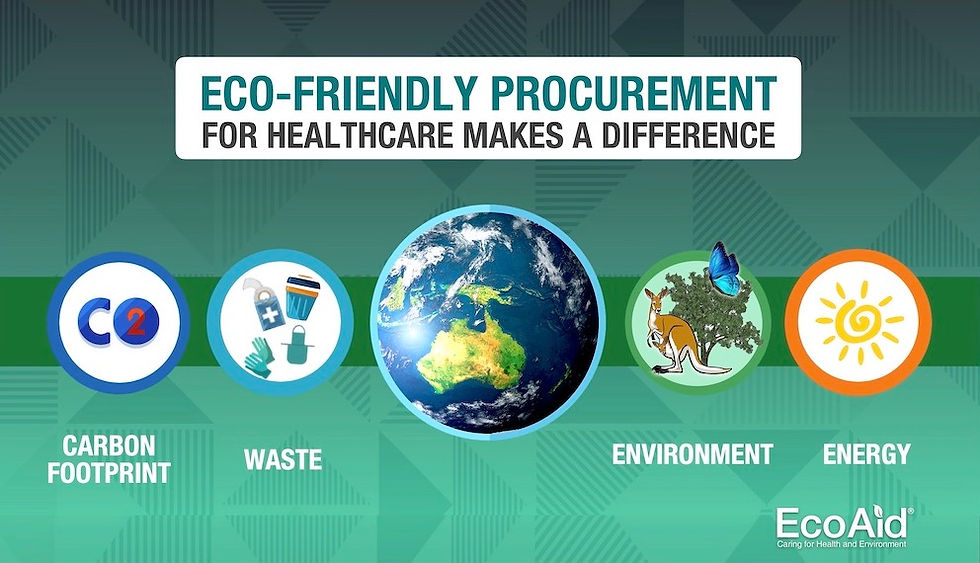Eco-Friendly Procurement for Hospitals is New Priority
- Nov 10, 2020
- 4 min read
Updated: Nov 28, 2020
Things Every Procurement Decision Needs to Satisfy – and the Importance of Triple Wins

▲ New ways of thinking can bring positive benefits to the procurement process
Our world is always changing. These changes have consequences for the health, survival and wellbeing of all humans.
Climate change is a big threat. It’s not just about hotter summers or bigger storms. It’s also about the gradual loss of land to the rising of the sea, reductions in biodiversity and loss of species. It’s also how changing weather patterns are stunting our food production.
This has social impacts with people in poorer communities usually the worst hit.
Further, the 2020 bushfires in Australia were estimated to have cost the economy $100 billion. (Yes, billion.)
Importantly, it is also provoking a health crisis. High heat days are increasing deaths in the elderly. Smoke from bushfires makes breathing difficult for everyone. Low-quality soils are producing low-quality food that impacts our nutrition profiles and our health.
What was once a comfortable planet is becoming a more difficult place to flourish and thrive on.
We need the right reforms at all levels of human existence in order to reduce these social and health impacts.
It is important to realise that our everyday decisions – particularly the ones that impact many people – do make a difference as to whether we survive or thrive on Planet Earth.
Our buying decisions are votes for either promoting or decreasing the effects of Climate Change.
What is Triple Win?
Traditionally, procurement and buying decisions focused on the single criteria of economics – how much will it cost? Cheaper was better.
This is no longer enough. If that is all we do we will not soothe the pain of Climate Change.
A more holistic buying frame needs to be considered.
A Triple Win considers three factors:
Environment (The health of our planet)
Economic (The health of our business)
Social (The health of our people)
Climate Change is a complex health issue.
The Triple Win approach acknowledges this by going deeper than the surface knowledge of how climate change is created. Instead, it looks for the links between the processes, and in some cases, cause and effect relationships are found to be at play.
For instance, hotter summers mean more need to cool poorly designed houses which costs more money and more energy. For those on limited incomes, this may become a choice between being cool or being able to buy the food they need.
We need a holistic approach to address the complex issues facing our personal health and the health of our planet. A Triple Win can help achieve this.
Procurement in the Global Health Sector
The global health sector has a sizeable carbon footprint, estimated to be between 5-8% of a nation's output.
The key way to impact this is through our procurement process and adopting a triple win approach.
The end-user – nurses, doctors and medical teams can only use the equipment and facilities provided to them. If they are given a piece of stainless-steel hollowware, they have little choice about using it. The decision has already been made for them.
As a result, as much as they might want to, their impact on Climate Change is reduced.
The real impact happens at the point at which a purchase is made. One buying decision has a multiplying effect. A purchase of 1000 hollowware units impacts 1000 actions down the line.
Repeating this consistently across all of our buying decisions is where the biggest difference can be made.
How EcoAid products support a Triple Win
The EcoAid Sugarcane Series impacts the Triple Win at multiple levels.
> Environment
EcoAid hollowware is made from 100% sugar cane. This is 100% biodegradable in 60-90 days. In other words, ultimately there is no waste. Further, it can be recycled into new uses.
In contrast, plastic hollowware can take up to 500 years to decompose in landfills.
While the environmental advantage of EcoAid hollowware may be enough to persuade, it also matches or surpasses plastic products because it is suitable for both hot and cold use, is puncture resistant and waterproof.
> Economic
The Eco-Aid Sugarcane Series is a cost-effective choice.
The cost of a single Eco-Aid Single-use Biodegradable Anaesthetic tray is about quarter the price of rewashing a plastic anaesthetic tray.
West Sydney Local Health saved approximately $185,000 in a year through a single product purchase.
> Social
Plastic hollowware needs to be cleaned so it can be re-used. This raises the significant risk of generating cross-infections and contaminations between patients. That’s not healthy.
In contrast, medical-grade EcoAid sugarcane-based hollowware is affordable in terms of both dollars and environmentally so it can be disposed of responsibly after a single use by either recycling or composting.
Vote with your Procurement Decisions
Every buying decision we make every day has an impact on our planet. We encourage you to join with EcoAid in promoting procurement that serves a healthy planet and a healthy life for all people.
Vote for a healthy future with your next procurement decisions.
___________
References
NSW/ACT Regional Committee, 2020. Sustainability In Healthcare. [video] Available at: https://m.youtube.com/watch?feature=youtu.be&v=vIoHXq_Aj4w [Accessed 18 October 2020] Climate.leeds.ac.uk. 2020. Triple-Win Adaptations Tackle Climate Change, Land Degradation And Biodiversity Loss: Priestley International Centre For Climate. [online] Available at: https://climate.leeds.ac.uk/research/understanding-risk-to-develop-a-resilient-world/triple-win-adaptations-tackle-climate-change-land-degradation-and-biodiversity-loss/ [Accessed 14 October 2020].
Bell, Khan, Romeo-Velilla, Stegeman, Godfrey, Taylor, Morris, Staatsen, van der Vliet, Kruize, Anthun, Lillefjell, Espnes, Chiabai, de Jalón, Quiroga, Martinez-Juarez, Máca, Zvěřinová, Ščasný, Marques, Craveiro, Westerink, Spelt, Karnaki, Strube, Merritt, Friberg, Bélorgey, Vos, Gjorgjev, Upelniece and Costongs, 2020. Ten Lessons For Good Practice For The INHERIT Triple Win: Health, Equity, And Environmental Sustainability.
Ellis, N.R. and Tschakert, P., 2019. Triple-wins as pathways to transformation? A critical review. Geoforum, 103, pp.167-170.




Comments